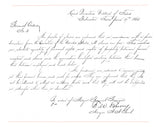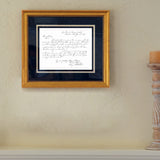



Juneteenth General Order No. 3 Reproduction
- National Archives Store Exclusive
- Made in Philadelphia, Pennsylvania
- Document facsimile, unframed
- Parchment paper, unique in appearance, with crinkles and aging process characteristics. Please note that the parchment may darken over time. We recommend framing behind UV protective coated glass to avoid this discoloration
- Approximately 14 1/2 X 11 1/2 inches
-
This unframed reproduction was made exclusively for the National Archives Store. It depicts the handwritten record of General Order No. 3, which on June 19, 1865 announced to the citizens of Texas that all enslaved people were now free. This remastered piece deserves to be shown at any time of year and is a great tool for educators and classrooms.
The original document is a journal entry, stretching across two pages. For improved presentation and enhanced readability, we have consolidated the two pages. You can see a digital version of the original in NARA's online catalog here.
-
On June 19, 1865, two and a half years after President Abraham Lincoln’s historic Emancipation Proclamation, U.S. Maj. Gen. Gordon Granger issued General Order No. 3, which informed the citizens of Texas that all enslaved people were now free. Granger commanded the Headquarters District of Texas, and his troops had arrived in Galveston the previous day.
This day has come to be known as Juneteenth, a combination of June and 19th. It is also called Freedom Day or Emancipation Day, and it is the oldest known celebration commemorating the end of slavery in the United States.
The official handwritten record of General Order No. 3 is preserved at the National Archives Building in Washington, D.C.
General Order No. 3 states:
“The people of Texas are informed that, in accordance with a proclamation from the Executive of the United States, all slaves are free. This involves an absolute equality of personal rights and rights of property between former masters and slaves, and the connection heretofore existing between them becomes that between employer and hired labor. The freedmen are advised to remain quietly at their present homes and work for wages. They are informed that they will not be allowed to collect at military posts and that they will not be supported in idleness either there or elsewhere.”